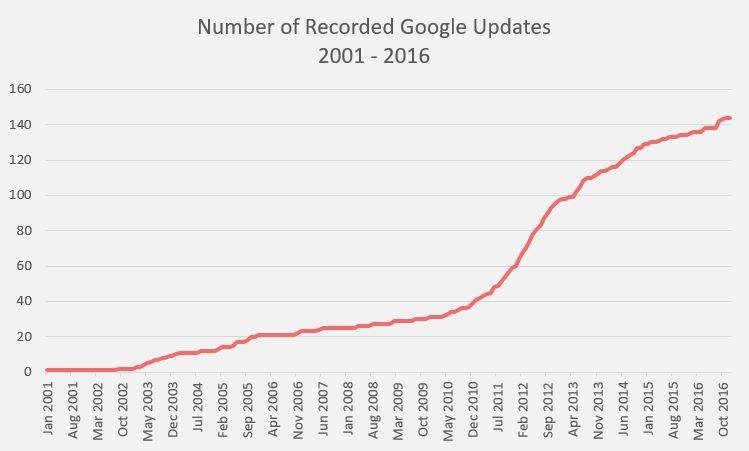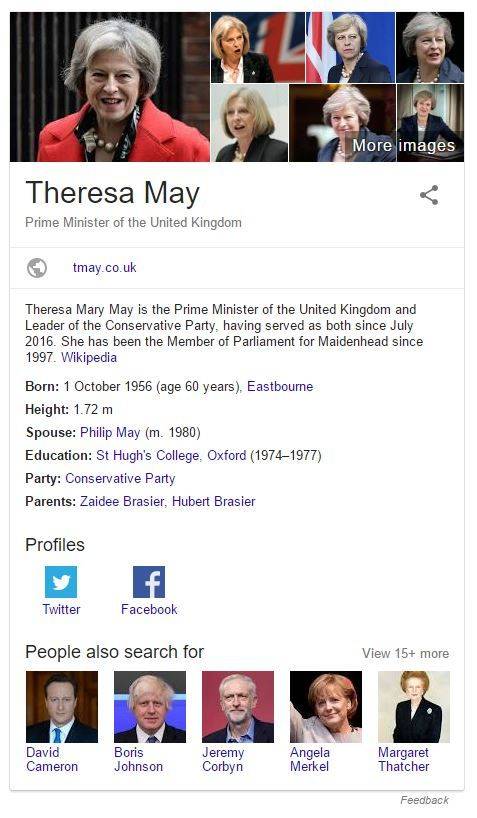Forget SEO. This is the next gold rush.
Artificial Intelligence Optimisation is the future.
Author
Barry Bell
Date
03.10.2022

Search Engine Optimisation (SEO) has always been about change, and how we react to those algorithm updates.
It’s about the gold rush – finding out the next big thing which drives traffic and jumping on it first, to give businesses an advantage over their competitors.
The things we chase and changes we make may be permanent, such as mobile-friendly websites gaining a ranking bonus on mobile searches, or they may be more temporary, such as websites ranking higher if they include the keywords they wished to rank for in their domain name (which was actually removed back in 2012).
As these changes stack up, the fundamentals of basic SEO keep growing. Today, a graph showing cumulative updates over time looks a bit like this:

Each update in this graph was manually implemented by a team at Google trying their best to make Google show the user the most relevant result for their search.
Machine learning
Google’s artificial intelligence work, RankBrain, is all about using machine learning to optimise search, rather than relying on large, over-arching algorithms designed by a team. This means that instead of waiting months for an update, such as the two-year wait for Penguin 4.0, we can see rankings change by the second.
More than that, rankings increasingly aren’t a fixed set, despite how we often think of them as being relatively static. There aren’t monolithic rankings which change every so often by the flick of a switch. Instead, there is a varying set based on personal factors, such that we both would see very different results to each other – and even to ourselves when other variables like location or time of day change.
Some of this has already happened, but it’s only going to accelerate, and it will be hidden behind the web of AI decision-making and what’s best for the user, rather than a straightforward instruction of “Put your keyword at the beginning of a Title tag.” Rather than having to manually tinker to see what works, Google can let AI test a whole host of variables, such as if red websites in general work better for users, or if people prefer ‘Website A’ over ‘Website B’ at certain times of the day.
Entities & voice search.
Alongside this, Google has been steadily increasing its understanding of individual entities, most obviously in the Knowledge Graph, such as this:

There are also featured snippets, which are very similar, particularly in this case:

This has been handy for some time, but is crucial for voice search, for two reasons:
- Natural language
- Short responses
Natural language
People who are speaking in natural language to their device will describe things differently than if they were sat in front of a search box. I haven’t sat around saying, “OK Google, prime minister”, but I will say, “OK Google, who is the prime minister?” We will describe the same thing in a variety of ways which all basically mean the same thing in most peoples’ minds, like:
Britain Great Britain GB United Kingdom UK United Kingdom of Great Britain United Kingdom of Great Britain and Northern Ireland And so on.
Short responses
Things like the Knowledge Graph and Quick Answers are a boon to voice search, as it gives something short and useful to the user. If I ask Amazon’s AI assistant, Alexa, a quick question, I don’t want it to go on a long ramble, and much of the time I won’t want it to direct me to a web page; I just want it to give me something useful.
Artificial intelligence
All of this leads us to the increased usage of AI Assistants, chatbots and their agents, which Google and others are putting incredible resources behind, with a high likelihood that it will eventually replace traditional search for a large proportion of queries. We already know that 20% of all searches made with the Google Android app in the US is a voice query, and 25% of Bing searches on the Windows 10 taskbar use voice too.
A nice demonstration of how chatbot interactions will work for Google Assistant can be seen in the below gif (from The Verge):
Some of how this works will rely on websites and standard SEO techniques we have all come to rely on, but large proportions won’t, which provide brands with incredible opportunities to stay ahead of their competition. Brands must adapt their processes and their technology to keep up, and gain competitive advantage.
We need to adapt for machine learning, and for natural language. We need to put the user first and make sure the AI agents and assistants have everything they need to talk about your business or brand before your competitors.
This is the next gold rush.